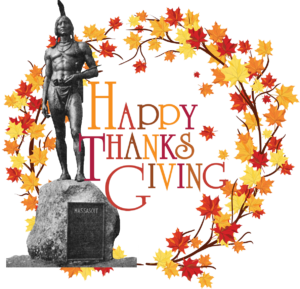There will undoubtedly be people this Thanksgiving who, amid pandemic conditions and tough economic times, wonder what there is to be thankful for. Robert A. Emmons (@Dr_RobertEmmons), a professor of psychology at the University of California, Davis, and the world’s leading scientific expert on gratitude, wrote the following during the midst of the Great Recession back in the 2013:
“A decade’s worth of research on gratitude has shown me that when life is going well, gratitude allows us to celebrate and magnify the goodness. But what about when life goes badly? In the midst of the economic maelstrom that has gripped our country, I have often been asked if people can — or even should — feel grateful under such dire circumstances. My response is that not only will a grateful attitude help — it is essential. In fact, it is precisely under crisis conditions when we have the most to gain by a grateful perspective on life. In the face of demoralization, gratitude has the power to energize. In the face of brokenness, gratitude has the power to heal. In the face of despair, gratitude has the power to bring hope. In other words, gratitude can help us cope with hard times.”[1]
Throughout the ages the benefits of gratitude have been espoused by people of all cultures and all faiths. The Greek philosopher Epictetus, who was born a slave, wrote, “He is a wise man who does not grieve for the things which he has not, but rejoices for those which he has.” An anonymous author reflected a similar thought, “Gratitude turns what we have into enough.” More recently, Oprah Winfrey echoed a similar sentiment. She stated, “Be thankful for what you have; you’ll end up having more. If you concentrate on what you don’t have, you will never, ever have enough.” A Buddhist proverb may sum it up best. It states, “‘Enough’ is a feast.”
The Roman statesman and philosopher Marcus Tullius Cicero once stated, “A thankful heart is not only the greatest virtue, but the parent of all the other virtues.” Similarly, a modern religious leader, Gordon B. Hinckley, stated, “Gratitude is the beginning of civility, of decency, of goodness, of a recognition that we cannot afford to be arrogant.” Gautama Buddha taught, “Wise men appreciate and are grateful. Wise men try to express their appreciation and gratitude by some return of kindness, not only to their benefactor, but to everyone else.” A modern religion leader and scholar, Neal A. Maxwell, stated the same thought this way, “We should certainly count our blessings, but we should also make our blessings count.” The Catholic theologian Thomas Aquinas taught, “Thanksgiving is a special virtue. But ingratitude is opposed to Thanksgiving. Therefore ingratitude is a special sin.” Rabbi Harold Kushner adds, “If you concentrate on finding whatever is good in every situation, you will discover that your life will suddenly be filled with gratitude, a feeling that nurtures the soul.”
Tecumseh, the great Native American chieftain, who knew his share of hardship, once stated, “When you arise in the morning give thanks for the food and for the joy of living. If you see no reason for giving thanks, the fault lies only in yourself.” Emmons puts it this way, “Being grateful is a choice, a prevailing attitude that endures and is relatively immune to the gains and losses that flow in and out of our lives. When disaster strikes, gratitude provides a perspective from which we can view life in its entirety and not be overwhelmed by temporary circumstances. Yes, this perspective is hard to achieve — but my research says it is worth the effort.”
Being grateful does not mean being Pollyannish (i.e., being irrepressibly or excessively optimistic). Emmons notes, “No one ‘feels’ grateful that he or she has lost a job or a home or good health or has taken a devastating hit on his or her retirement portfolio. But it is vital to make a distinction between feeling grateful and being grateful.” He also reminds us that the Thanksgiving holiday has a historical connection to suffering and hard times. He explains, “Trials and suffering can actually refine and deepen gratefulness if we allow them to show us not to take things for granted. Our national holiday of gratitude, Thanksgiving, was born and grew out of hard times. The first Thanksgiving took place after nearly half the pilgrims died from a rough winter and year. It became a national holiday in 1863 in the middle of the Civil War and was moved to its current date in the 1930s following the Depression. … So crisis can make us more grateful — but research says gratitude also helps us cope with crisis.”
Emmons goes on to note that his studies about gratitude have shown that people who found themselves in trying conditions often discovered that “out of something bad (suffering, adversity, affliction) came something good (new life or new opportunities) for which the person felt profoundly grateful.” Attitude is often what makes the difference. Someone once noted, gratitude is simply a shortened form of great attitude. Regardless of your circumstances, I hope you find something to be thankful for today.
Footnotes
[1] Robert A. Emmons, “How Gratitude Can Help You Through Hard Times,” Greater Good Magazine, 13 May 2013.





